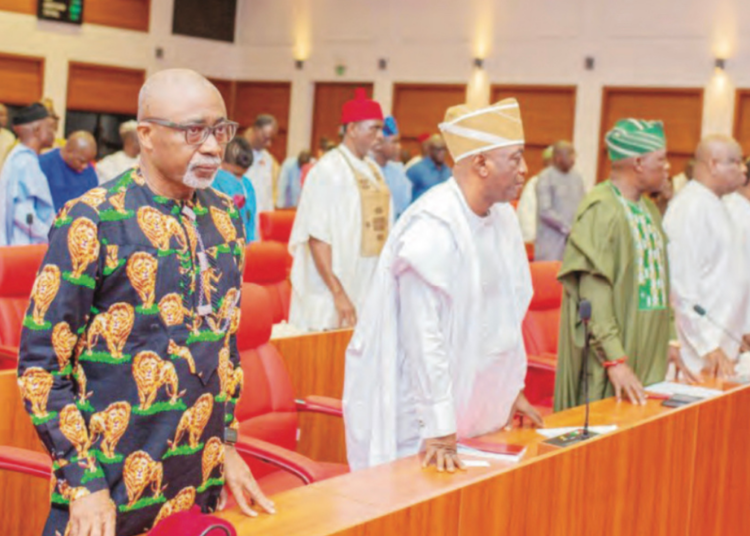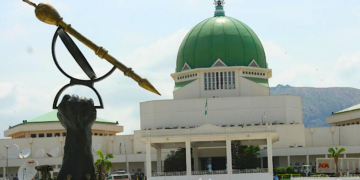A constitutional crisis looms as the Nigerian Senate has passed a resolution asking President Bola Ahmed Tinubu to withhold funds to Local Government Councils that don’t have elected chairmen.
The Senate resolution is however contrary to several Supreme Court judgements, stating that the President does not have the power to withhold funds allocated to the states and local governments.
The resolution has already drawn criticism and is bound to set up the lawmakers against the Supreme Court, state governors and unelected officials who are currently holding sway at the local government level.
LEADERSHIP Weekend reached out to a number of state government and local government officials on their feelings about the Senate resolution.
They were all reluctant and speak openly about the calls to cut off funds, hoping instead that the resolution would amount to nothing.
A Lagos-based lawyer, Mrs Omobolanle Adetunji, however said that the resolution is unconstitutional and that the President should ignore it in his best interest and the country’s interest.
Adetunji stated, “I believe that President Bola Tinubu is not politically naive to allow himself to be misled to illegally withhold statutory funds meant for Local Government because that move is not only unconstitutional but has been conclusively adjudicated upon by the Supreme Court of Nigeria.
She said the courts have, in several cases, decided that the President or even the National Assembly can not stop, withhold or even warehouse in a dedicated account the statutory funds belonging to other levels of government.
She said, “Let the lawmakers concentrate on what they have the power to do and leave those things they can not lawfully do.”
During plenary on Friday, the Senate urged President Bola Ahmed Tinubu not to release funds to the Local Governments that don’t have elected chairmen and councillors.
This followed a motion sponsored by the Senate minority leader, Abba Moro who lamented the inability of some state government to conduct local government elections.
But in their resolution, the Senate urged the executive to withhold statutory allocation to the local governments councils not democratically elected.
The resolution condemned the arbitrary dissolution of democratically elected local government councils in Benue and other states in Nigeria.
It urged the governor of Benue state to adhere to his oath of office to obey the rule of law and defend the Constitution of the Federal Republic of Nigeria.
The Senate resolution called for a “review the governor’s dissolution of the elected councils and constitution of caretaker committees and reinstate the elected council executive forthwith.”
Senator Abba Moro (Benue South) who is the Senate minority leader said he notes with dismay the dissolution of democratically elected councils in Benue State.
“Also notes that placing caretaker committees to replace elected councils is an aberration and alien to the 1999 Constitution of the Federal Republic of Nigeria (as amended);
“Aware that Section (1) of the 1999 Constitution of the Federal Republic of Nigeria (as amended) guarantees a system of local government by Democratically Elected Councils;
“Also aware that it is the Constitutional responsibility of every state to ensure the existence of Local Government Councils by law.
“Further aware that there are subsisting court rulings directing the Governor, the House of Assembly, their agents, privies etc not to tamper with the tenure of the elected Councils, and
“Equally aware that the Governor/Government of Benue State have not appealed these judgments and that it is against the grain of the rule of law,,” he said.
While it is also unconstitutional for a state government to dissolve local government elected executive, based on the supreme court judgement, there seems to be constitutional crisis if President Bola Ahmed Tinubu goes ahead with the Senate directive.
Contributing to the Senate debate, Adams Oshiomhole (Edo North) said about 16 states in Nigeria are currently without democratically elected council officials.
He said the Senate should direct the Finance Minister to stop funding LGs without elected council officials. The suggestion was also supported by the Senate Chief Whip, Ali Ndume.
Also, Abdulfatai Buhari (Oyo North) who raised a different issue, said the Electoral Act should be amended to empower the Independent National Electoral Commission (INEC) to conduct local government elections.
The Senate President, Godswill Akpabio, a lawyer, just as the Senate leader, Opeyemi Bamidele and the Senate Committee Chairman on Judiciary, Mohammed Tahir Monguno; could only frown at the establishment of multiple federal agencies, but advocated for the creation of the National Electoral Commission for Local Government so that governors would no longer have overbearing influence on council polls.
The Supreme Court of Nigeria had on Friday, the 10th day of December 2004, in a judgement delivered by Justice Muhammadu Lawal Uwais, in a case S.C. 70/2004 between Attorney-General of Lagos State (Plaintiff) And Attorney-General of the Federation, (Defendant) on the issue of it’s withheld funds, said: The president has no power vested in him (by executive or administrative action) to suspend or withhold for any period whatsoever the statutory allocation due and payable to Lagos State Government pursuant to the provision of section 162 (5) of the 1999 Constitution but in respect of the 20 Local Government Areas for the time being provided by section 3 subsection (6) of the Constitution and not the new Local Government Areas created which are not yet operative.”
The current president, Bola Ahmed Tinubu was the governor of Lagos State when then President Olusegun Obasanjo withheld their funds which was later released by President Umaru Musa Yar’Adua.
Also, the Supreme Court in two separate judgments delivered on Friday, May 7, 2021, declared that the dissolution of elected local government administrations in Oyo and Katsina states by their respective state governments, was illegal and unconstitutional.
In suits filed by the local government administration in both states, elected local officials challenged the two governors on whether they had powers to dissolve the two local government councils.
The local council officials argued that the purported dissolution of their councils was in violation of section 7(1) of the Nigerian Constitution, which provides as follows: The system of local government by democratically elected local government councils is under this Constitution guaranteed; and accordingly, the Government of every State shall, subject to section 8 of this Constitution, ensure their existence under a Law which provides for the establishment, structure, composition, finance and functions of such councils.
Also, the Supreme Court adjudicated on the issue, declared Ekiti state Governor Kayode Fayemi’s dissolution of local government councils in Ekiti State, in his first term in office, as unconstitutional.
A practice has taken root across Nigeria over the control of the finances and elections of local government councils by governors and the ruling party in each state, with caretaker committees installed for the councils in some cases, as opposed to elected officials.
It has been observed that the local government structure has been characterised by gross ineffectiveness and inefficiency, defeating its purpose as government at the grassroots.
During the Constitution review process of the 9th Assembly for LG autonomy, states rejected it.





